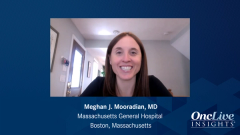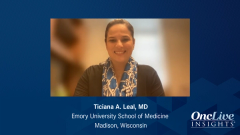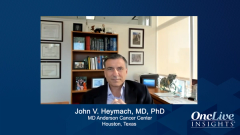
Optimizing Use of Molecular Testing in Advanced NSCLC
Considerations for optimizing the use of molecular testing in advanced non–small cell lung cancer, addressing insufficient tissue collection and liquid biopsy approaches.
Episodes in this series

Transcript:
Ticiana A. Leal, MD: In terms of insufficient tissue test reports in my practice, certainly that is still a significant issue, and sometimes a barrier that we need to overcome for genomic testing for patients with advanced non–small cell lung cancer. Anecdotally, I would say that insufficient tissue is probably seen in about 10% to 15% of my clinical practice. I think one of the important things is to work with a multidisciplinary team [MDT] as a way to overcome some of these potential biomarker testing barriers and challenges that occur. We have molecular tumor boards, where we can review images. One way the medical oncologist can help is by looking at images along with radiology, as well as the interventional pulmonologist or interventional radiologist, to try to help select the target that we hope will give us an adequate diagnosis, staging, as well as hopefully getting sufficient tissue to be able to get genetic testing results.I think the MDT approach, or the multidisciplinary approach, has a key role in maximizing this potential of getting adequate tissue for genetic testing, which is so important for our patients.
When is it appropriate to use blood-based assays vs tissue NGS [next-generation sequencing]? Increasingly, liquid biopsy has been used for genetic testing in advanced non–small cell lung cancer. And certainly, when there are issues with having inadequate tissue or insufficient tissue, a liquid biopsy can address some of these challenges. This is a minimally invasive procedure, you can identify these biomarkers if there is insufficient tissue or the tissue is inadequate for analysis. Another important thing with liquid biopsy is you do have a more rapid turnaround time. We’ve now seen the 2021 International Association for the Study of Lung Cancer consensus statement outlining 3 potential diagnostic approaches for the use of liquid biopsy: using a sequential approach, a complementary approach, or a liquid biopsy first approach. In my practice, I think increasingly, we’ve been doing the complementary approach, where we do a tissue biopsy as the gold standard in non–small cell lung cancer and complement that with the liquid biopsy. But it’s really important to know that if you do a liquid biopsy approach first, that if the result is negative, you still do need to rely on that tissue test when feasible because the presence of a driver mutation can’t be ruled out from a liquid biopsy sample alone.
Molecular testing should be done at initial diagnosis for patients with advanced non–small cell lung cancer with nonsquamous histology. There are certain situations for patients with squamous histology in which I would recommend molecular testing as well, including for patients with small samples, or for patients who have mixed histology. Then I would send off the NGS testing on the adenocarcinoma component of that biopsy specimen. For patients with earlier stage disease who have resection of their non–small cell lung cancer, we do recommend molecular testing, either post-surgery or perhaps on the biopsy done prior to surgery, again, looking for EGFR now that we have EGFR-targeted therapy approved in the adjuvant setting. Another role for NGS, or next-generation sequencing, is for patients who are on initial targeted therapy, then they have progression of their cancer, and at that point, we’re looking for resistance mutations. Can we identify on-target resistance mutations that would help us identify potential treatment options or clinical trials for patients if there is an actionable resistance mutation identified?
Transcript edited for clarity.







































